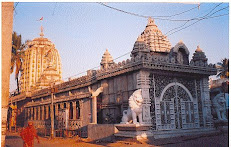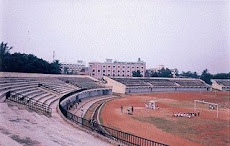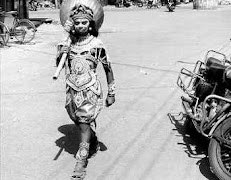By: HEMANTA KUMAR PRADHAN
Having experienced a ferocious cyclonic storm Phailin on
October 12 last at Brahmapur, I along with a few fellow reporters undertook a
motorcycle journey on the October 13 morning to see how the monstrous storm had
wrecked havoc and left a trail of devastation in coastal Ganjam and its
neighbouring districts.
As the Indian Meteorological Department (IMD) had predicted
that the cyclonic storm would badly affect the villages and towns between
Balugaon and Brahmapur, we decided to start our journey from Brahmapur to
Balugaon to get a first-hand report on the ravages of Phailin. Though the wind
speed had deceased considerably, we were still haunted by fear of the wind
turning frightful again.
We visited various places of the city and captured photos of
heaps of rubble, uprooted trees and electric poles and snapped wires across the
city.From the First Gate of Brahmapur to the Gopalpur junction, the city wore a
fearful look. Most of the old and new trees had toppled, while water was running
over road from Roland Institute to Gopalpur junction as Bahana Nala had
overflowed. The main road connecting NH-5 was disconnected. We looked for the
shortcuts but they too had been blocked as uprooted trees kept lying over them.
So, we took a bypass road via Lanjipalli over bridge to reach NH-5 so that we
could move to Balugaon.
When we crossed Lanjipalli, we got to know the death of a
child at Bijipur in wall collapse and another similar case at Gosani Nuagaon in
the city. Storm didn’t show any mercy to the telephone towers and electric
poles and transformers. The telecommunication and electricity supply was badly
hit. We visited Ayodhya Nagar, Gajapati Nagar, Lochapada and Aska Road and saw
the areas in ruin. The Brahmapur railway station was also destroyed. The kutcha
and asbestos houses were badly affected in the storm near the station.
We managed to cross streets of the city with much difficulty
as they had been filled with damaged branches and leaves and broken electric
poles rounded with wires. We touched the NH-5 and set off for Balugaon. On the
way, a truck driver told us that a few lorries had turned turtle near Konishi
after being hit by the cyclonic storm. The wind was still blowing at a high
speed, enough to shake our motorcycle, in which we were travelling. But it
hardly had the strength to shake our determination to move ahead and see the
large-scale devastations and wreckages.
The low-lying areas with paddy crops to the right side of
the NH had been fully submerged. During our journey, we passed many petrol
pumps beside the NH, which too had faced the ire of the cyclone. With their
shades damaged, most of them had shut down. We hardly saw any people or any
vehicle on the road. A dead silence had reigned supreme everywhere. We crossed
Jagannathpur junction and then Mandiapalli, which connects Gopalpur beach via
Berhampur University. Two reporters who camped at the university campus joined
us at the junction. What they told us about the devastation the university had
gone through was shocking. The university was famous for its greenery having
thousands of trees, but the storm had stripped it of its pride possession and
rendered it barren. It hurt us when we knew that the dreaded storm had not
spared the deer park, classrooms and hostels inside the campus of the
university.
We took a glance of a high school near the NH at
Chamakhandi, which was filled with broken trees. Then we saw a few village
roads connecting the NH filled with uprooted trees. Most fruit-bearing trees
had been badly damaged. We reached the district headquarters town of
Chhatrapur. The Collectorate and residence of the Collector had been affected.
The storm had not spared a single building with asbestos roof. Educational
institutions had been damaged. We visited the people in the relief centre at
Onslow High School. While talking with the poor people of the cyclone-hit area,
we were told how the victims had undergone a harrowing experience on the
previous night.
Our team resumed journey and passed the Tampara Lake after
Chatrapur. The gigantic mango, coconut, jackfruit and eucalyptus plants along
NH were kissing the ground. We came across a damaged roadside hotel A1 dhaba
near the lake where three lorries had overturned. Then we crossed the
overflowing Rushikulya and reached Purunabandha-Binchhanapalli cyclone shelter
after Ganjam town. The fishermen were about to leave the shelter as wind had
been quite slow. Taking some dry food given by the administration, the fishermen
were leaving the cyclone shelter for their homes, but they looked to be
stressed with anxiety, apprehension and fear about the safety of their houses
and the belongings, especially the fishnets and boats.
An electric sub-station at Humma had been damaged. After
crossing the Palur junction, we reached severely affected coastal villages such
as Podagada, Jhatipadar, Barapalli under Ganjam block. We stopped at Sai dhaba
where two lorries had met a mishap. We reached Gopinathpur coming under Ward 6 of
Rambha NAC. Out of total 14 families living in the village, 12 kutcha houses
were badly damaged. Coconut trees, bamboo and eucalyptus trees had toppled over
houses. Two persons were injured due to the sudden fall of the trees, said a
homeless villager Rama Nath.
We then moved towards a few severely affected villages like
Jharedi, Kantapada, Sipakuda and Madhurchua near the Chilika lake. We got to
know that a few fishing villages near Sabulia were also affected when water of
the lake gushed into their villages. We were astounded after seeing a huge loss
of fruit-bearing trees in the groves. Before reaching Badaghati, we saw a
village road to Pana Nuagoan filled with uprooted old trees and a damaged
autorickshaw near a huge tree. On the day of the cyclone, driver Parameswar was
killed after a huge tree fell down on him while crossing the road.
We wanted to move to Khallikote, but a local advised us not
to go there as the road was not clear. We continued our journey and reached
Keshpur at 9am. The Chilika water had entered the paddy fields and inundated
many villages of Pathara panchayat. When we reached Balugaon, we found people
slowly coming out of their houses. Everywhere, we saw heaps of debris and
fallen and broken trees.
People everywhere were demanding relief like dry food since
people had lost their homes and belongings in the gale. Starving children were
staring at us helplessly. As relief had not been supplied to them in time,
angry locals near Balugaon were preparing to hold a road blockade on NH-5.
Source: The Pioneer

















.jpg)


















































No comments:
Post a Comment